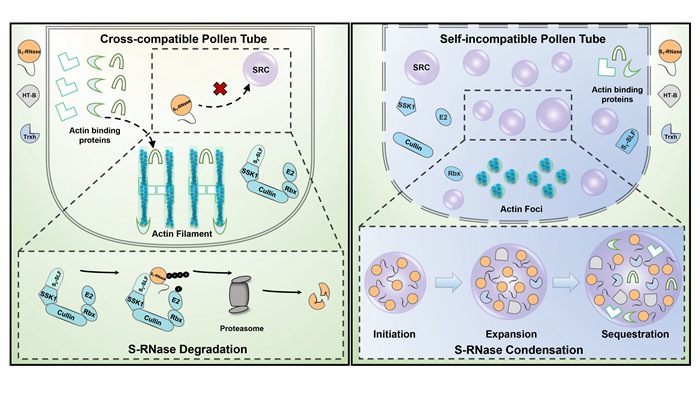Self-incompatibility (SI) is a widespread intraspecific reproductive barrier in flowering plants, a system for rejecting self-pollen to prevent seed set after self-pollination. In the Solanaceae, Plantaginaceae, Rosaceae, and Rutaceae, the SI system is controlled by a single polymorphic S-locus encoding the linked pollen factor S-locus F-box box proteins (SLFs) and pistil factor S-RNase components. Recent studies reveal that non-self S-RNase is degraded by the SCFSLF-mediated ubiquitin-proteasome system in Petunia, but how intact S-RNase functions in self-pollen tube cytoplasm to elicit the self-incompatibility response remains unclear.
The research group of Prof. XUE Yongbiao, from the Institute of Genetics and Developmental Biology (IGDB), Chinese Academy of Sciences, recently found that S-RNases form a membranelless puncta structures, called S-RNase condensates (SRCs), through phase separation in the cytoplasm of self- but not non-self-pollen tubes in Petunia hybrida. Further transgenic experiments showed that SRCs are required for the self-incompatibility response.
The researchers then confirmed the inhibitory or promoting effects of the pollen compatibility factors, the pistil incompatibility modifying factors HT-B and SSK1, and the redox state of the pollen tube on SRC formation.
In addition, the researchers also identified SRC interacting components by in vitro SRC reconstruction and LC-MS to study SRC functions and found that the SRCs formed in self-pollen tubes mainly assemble and enrich actin binding proteins such as PhABRACL, a promoter of actin polymerization.
Finally, the researchers found that SRCs indirectly impair self-pollen tube cytoskeleton integrity by sequestering actin binding proteins.
Taken together, S-RNase initiates SRC formation by phase separation, HT-B and Trxh promote its expansion, which in turn sequesters actin binding proteins, and then drives a self-incompatible response by indirectly interfering with the cytoskeletal organization in P. hybrida, uncovering a new mechanistic mode of SI in angiosperms.
This work, entitled “Phase separation of S-RNase promotes self-incompatibility in Petunia hybrida” was published online on 14 November 2022 in the Journal of Integrative Plant Biology (DOI:10.1111/jipb.13584). This research was funded by the National Natural Science Foundation of China and the Strategic Priority Research Program of CAS.
Figure. Phase separation of S-RNase promotes self-incompatibility in P. hybrida
Contact:
Prof. XUE Yongbiao
Institute of Genetics and Developmental Biology, Chinese Academy of Sciences
 Figure. Phase separation of S-RNase promotes self-incompatibility in P. hybridaContact:Prof. XUE YongbiaoInstitute of Genetics and Developmental Biology, Chinese Academy of SciencesEmail: ybxue@genetics.ac.cn
Figure. Phase separation of S-RNase promotes self-incompatibility in P. hybridaContact:Prof. XUE YongbiaoInstitute of Genetics and Developmental Biology, Chinese Academy of SciencesEmail: ybxue@genetics.ac.cn CAS
CAS
 中文
中文




.png)
